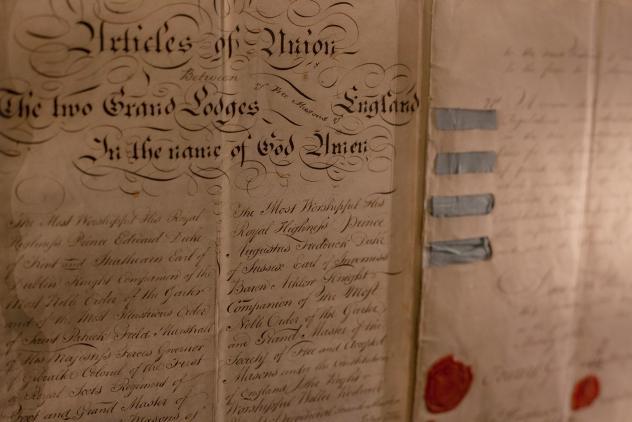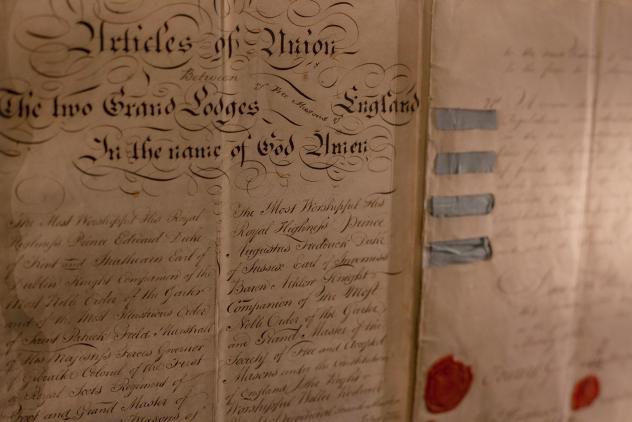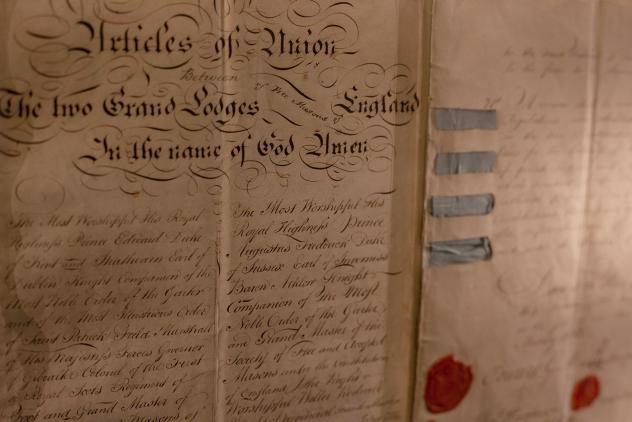Loans Out Policy
This policy was reviewed by the Museum of Freemasonry Council on 5th May 2022 and is due to be reviewed no later than May 2027.
Introduction
The purpose of this document is to enable the Museum of Freemasonry to be accountable for outgoing loans and to define our processes and standards for lending. It also acts as a guide to borrowers about our loans processes.
The policy covers the loan out of items from our Library, Museum and Archival Collections.
This policy replaces all former loans out policies or practices. Any existing loans out made under previous arrangements will in due course be reviewed and updated in line with this policy.
Principles
2.1 Why we lend
The Museum of Freemasonry lends items in order to make its collections more widely accessible, both physically and intellectually and further our knowledge, understanding and scholarship relating to items in our care. Loans out are primarily made on the basis that beneficial public access is given to the items, which is usually through displays and exhibitions.
2.2 Who can borrow
Loans out are made to a variety of institutions both nationally and internationally. This includes museums, galleries, libraries and archives, who are usually accredited bodies. Loans out are not made to private individuals.
2.3 What we lend
We will consider the loan out of items from our Library, Museum and Archival collections. On rare occasions, a loan request may be declined to safeguard personal data in accordance with data protection legislation. Normally only a maximum of 10 items will be lent per loan, although in exceptional circumstances we may consider lending more.
2.4. Inclusive practice
We will consider access, diversity and inclusion when assessing loan requests and throughout the lending process. Our collections have complex histories and contexts; we aim to take a respectful and inclusive approach to their display and interpretation and encourage our borrowers to do the same.
2.5 Period of loan
Loans out are always for a set period. This will normally be short term for a minimum of 2 months, and depending on the items being requested, could be up to a maximum of 9 months. Long-term loans and touring exhibitions will be considered, but any agreement to lend will be based on the suitability of the items, conservation and preservation status and the borrowing venues and location.
2.6 Notice period
UK loan out requests must be received a minimum of 6 months before the exhibition or display opening date, and are subject to approval by our Collections team and the Museum of Freemasonry Board of Trustees.
For requests of more than 10 items, we ask for a minimum of 9 months’ notice in advance of the borrower’s exhibition opening date.
International borrowers are expected to submit a request at least 1 year in advance of their exhibition opening date.
2.7 Loan agreement
A loan agreement will be issued for all approved loans out, which will outline the purpose and terms of the loan. Every borrower must sign this agreement before the loan commences.
2.8 Illicit trade
We will not lend to any exhibition or display that appears to include illicitly traded items and specifically contravenes the UNESCO Convention on the ‘Means of Prohibiting and Preventing the Illicit, Export and Transfer of Ownership of Cultural Property, 1970’.
Guidance for borrowers
3.1 Preliminary enquiries
Prospective borrowers are encouraged to carry out preliminary research before making a loan request. A useful resource for planning a loan request is the Collections online catalogue, which gives details of the Library, Archival and Museum collections. The Museum welcomes informal, early contact to discuss item selection and the practicalities of borrowing. Please make contact and your request will be directed to the relevant department.
3.2 Formal requests
When a loan is initiated by a borrower, a formal request must be sent to Museum of Freemasonry, Freemasons’ Hall, 60 Great Queen Street, London, WC2B 5AZ.
All requests should contain the following information:
- title of the exhibition / display
- exhibition / display venue(s), with opening and closing dates
- name and full contact details of the organiser
- a general outline of the exhibition
- list of item(s) requested with reference numbers
- reason for inclusion of the items in the exhibition / display
- an undertaking to meet all direct costs arising from the loan, which may include conservation, mounting / framing, packing, transport, insurance and couriering
Your request should also include:
- A completed and up-to-date Facilities Report for each venue. We normally ask that a venue fills out the UK Registrars' Group Standard Facilities Report, Security Supplement, and Display Case Supplement (if applicable). However, if a similar pre-prepared report already exists, this is usually acceptable.
- Environmental readings (temperature and relative humidity) for a period equivalent to the loan
3.3 Loan approval
Once a formal loan request is received, it will be presented to the relevant Collections team for review. In considering a request, the Collections team will take into account how the loan supports our mission and objectives, inclusive practices, the availability and condition of the item(s), our existing commitments, and the risks involved. A proposal will be then put forward to the MoF Board of Trustees, who will make a final decision on approving or declining the request.
If a loan request is approved by the Board of Trustees, you will receive a formal letter to acknowledge this. Subsequently, more detailed discussions about the display methods, display location, packing, transport, couriers, images and reproduction rights, and any other special requirements will then take place. This may include details of any requirements to turn volume pages or archive folios if items are placed on display for extended periods. Light levels are of great concern when exhibiting items from our archival and library collections and we may seek more information before confirming loans or request items are covered when not subject to access to reduce Lux levels as much as possible. If a loan request is declined, you will receive a formal letter with the reasons why the request has been declined.
3.4 Costs
The Museum of Freemasonry expects borrowers to cover all direct costs connected with the loan, such as:
- Mounting, framing and glazing
- Manufacture of cradles or mounts for books and archival and museum items
- Packing
- Collection and return transportation
- Nail-to-Nail insurance
- All courier costs as required (including travel, accommodation and subsistence)
- Conservation work completed by external contractors for items that need specialist assessment and treatment. In this instance, the cost of the initial condition assessment and any additional conservation work will be met by the borrower
- Photography, in addition to that necessary for the loan (e.g. additional images of different page opening(s) from those being displayed)
All costs will be communicated to the borrower for their approval before any work is carried out.
3.5 Insurance
The borrower will need to insure all items, based on valuations provided by us, on an ‘agreed value’, ‘all-risks’, ‘nail-to-nail’ basis. A copy of the insurance policy must be sent well in advance of the loan date and a certificate of insurance received prior to the items being dispatched.
We will accept the UK Government Indemnity Scheme in lieu of commercial insurance, and may also be able to accept indemnities offered by other countries, provided a copy of the indemnity is provided well in advance for us to examine the terms.
If the borrower cannot provide adequate insurance or government indemnity, we reserve the right to take out commercial insurance at the borrower’s expense.
3.6 Environmental conditions
All items must be stored and displayed in a suitable environment. If specific environmental requirements for particular items are necessary, these details will be specified in the loan agreement and must be adhered to at all times.
Our normal requirements are a relative humidity set between 45–55% (with a +/- 5% in any 24-hour period) and a temperature of 18–21°C (+/- 2 degrees in 24 hours), and a maximum of 50 lux for light-sensitive material. However, we will treat each item on a case-by-case basis. We appreciate that some institutions may not have environmental control systems, and in these instances, are happy to work with the borrower to consider alternative ways of ensuring the correct conditions (for example the use of buffering materials in display cases).
3.7 Display methods
All methods of display and display materials must be agreed in advance.
Objects which are 2D works of art will be lent glazed and back boarded, unless otherwise agreed by the Museum. Hanging systems must be agreed by the Museum in advance.
Enclosures for items should be glazed cases. The glass should be laminated, normally 11.5mm five-ply and must conform to the current standard BS5544. They must be lockable and dust proof. An air exchange rate of one air change per day or less would be expected. Other types of enclosures (e.g. acrylic) may be considered.
Where coatings, sealants and adhesives are used within display cases, including printed display back boards, there must be ample time for off-gassing (a minimum of two weeks with good ventilation).
For some loans, information will be requested on other items to be displayed within the display case.
Items approved for open display should be placed at least a metre behind barriers, except otherwise agreed with the Museum. A physical barrier compliant with all health and safety regulations and considerations should be used unless otherwise agreed.
3.8 Packing and transport
All packing and transport must be completed to the specifications outlined by us, and will usually be arranged by the borrower. Typically, this will require an experienced fine art transport company, which must be approved by us prior to appointment. If packing cases are required these must be constructed as per our instructions (note, packing cases are required for all international loans). We will also want to approve all transport arrangements for the loan, such as routes and overnight stops, in advance.
3.9 Couriers
We reserve the right to send a courier with every loan for both the installation and de-installation, as well as for rotations or page turns if required. However, we recognise that courier costs can be significant to the borrowing institution and will work with borrowers to try and keep these down (for example by sharing couriers for some loans). We will make these decisions on a case-by-case basis.
When a courier is required for a loan, the borrower will arrange and pay for all required transport and hotel accommodation.
Couriers must receive adequate subsistence (to be agreed in advance) to cover all expenses, including a reasonable level of hotel accommodation for overnight stays. If public transport is used, couriers should travel first class by rail or business class by air when accompanying items. The Museum will consider sharing couriers with other lenders, depending on the individual circumstances.
In the case of touring exhibitions, the Museum will determine if a courier is required to accompany items between venues.
3.10 Arrival, condition checking and installation
On arrival, if items are not to be installed immediately, they must be stored in a secure environmentally controlled space. Particularly sensitive items may need 24 hours to acclimatise, but if this is necessary we will advise of this in advance.
Installation can only take place when the exhibition space is free from construction, with a minimum of 2 weeks allowed for adhesives, paints and varnishes to have dried and off-gassed. Items must not be unpacked until the space is ready for installation. If a courier has accompanied the loan, unpacking must wait until they are present.
A condition report will be sent for each item on loan. If a courier is present they will complete a condition check of the item with the borrower, with any changes noted on the report before signing. If no courier is present, the borrowing institution will complete the condition check. If any changes are noted, this must be reported to us immediately. Condition checks of the items must be carried out on a padded table and with suitable lighting.
Items must be installed by experienced technical staff and where applicable under the courier’s supervision. Once each item has been installed, it must not be handled further. Display cases containing items must be closed and locked in the courier’s presence, if one has been sent, and not re-opened without contacting us for approval, unless in an emergency.
This process will be completed in reverse for the takedown. Empty packing crates and material must be stored in a secure, waterproof and stable environment, and allowed to re-acclimatise before re-packing takes place.
3.11 Acknowledgement
Every item lent must be accompanied by the acknowledgement:
“© Museum of Freemasonry, London”
If additional acknowledgements are required, we will advise the borrower. This extends to use of the item (or images of it) in any publication or media coverage arising from the loan.
3.12 Images, photography and filming
We are happy for items on loan to be photographed by the public while on display, providing the item does not have copyright restrictions, flash is not used and the images are for personal non-commercial use.
If required, we will provide images of each item lent at no cost to the borrower. If additional images are requested (e.g. different page openings from those being displayed) then there may be a charge for this. Once contact has been made the borrower will be put in contact with the appropriate person, who deals with photography and filming. Please note that if items are in copyright and we are not the copyright holder, then it will be the borrower’s responsibility to obtain and clear all necessary permissions and rights to reproduce images of the items.
If a publication is produced by the borrowers, the Museum should be supplied with at least one copy.
3.13 During the loan
Borrowers should monitor items and their facilities throughout the loan period to ensure all conditions are adhered to. If any change, loss or damage is noted to an item, facilities vary, or loan conditions cannot be met, you must inform us immediately. In these circumstances, we may need to undertake a site visit to inspect the item(s), which would be at the borrower’s expense. In exceptional instances, it may be necessary to recall the items.
3.14 Renewal of loan
Short-term loans of less than one year usually cannot be renewed. Long-term loans will be considered for renewal, providing at least two months’ notice is given before the expiry date. Renewal will be subject to approval by our Collections team.
3.15 Cancelation
If a loan needs to be cancelled by the borrower, then we must be notified in writing. Even when a loan has been cancelled for valid reasons and this is before its dispatch date, we may still charge for any costs already incurred, such as framing or mount making.



